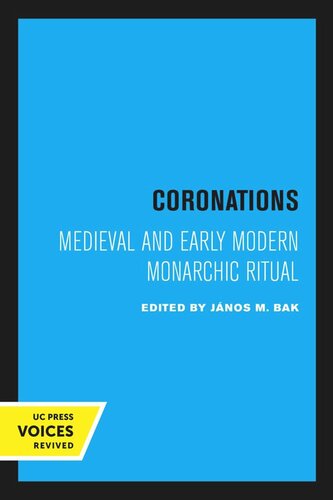

Most ebook files are in PDF format, so you can easily read them using various software such as Foxit Reader or directly on the Google Chrome browser.
Some ebook files are released by publishers in other formats such as .awz, .mobi, .epub, .fb2, etc. You may need to install specific software to read these formats on mobile/PC, such as Calibre.
Please read the tutorial at this link: https://ebookbell.com/faq
We offer FREE conversion to the popular formats you request; however, this may take some time. Therefore, right after payment, please email us, and we will try to provide the service as quickly as possible.
For some exceptional file formats or broken links (if any), please refrain from opening any disputes. Instead, email us first, and we will try to assist within a maximum of 6 hours.
EbookBell Team

4.8
84 reviewsFascination with royal pomp and circumstance is as old as kingship itself. The authors of Coronations examine royal ceremonies from the ninth to the sixteenth century, and find the very essence of the monarchical state in its public presentation of itself. This book is an enlightened response to the revived interest in political history, written from a perspective that cultural historians will also enjoy. The symbolic and ritual acts that served to represent and legitimate monarchical power in medieval and early modern Europe include not only royal and papal coronations but also festive entries, inaugural feasts, and rulers' funerals. Fifteen leading scholars from North America, Britain, France, Germany, Poland, and Denmark explore the forms and the underlying meanings of such events, as well as problems of relevant scholarship on these subjects. All the contributions demonstrate the importance of in-depth study of rulership for the understanding of premodern power structures. Emphasis is placed on interdisciplinary approaches, drawing on the findings of ethnography and anthropology, combined with rigorous critical evaluation of the written and iconic evidence. The editor's historiographical introduction surveys the past and present of this field of study and proposes some new lines of inquiry. "For 'reality' is not a one-dimensional matter: even if we can establish what actually transpired, we still need to ask how it was perceived by those present."